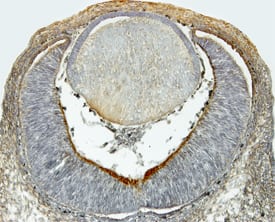Mouse Dkk-1 Antibody
R&D Systems, part of Bio-Techne | Catalog # AF1765


Key Product Details
Species Reactivity
Validated:
Mouse
Cited:
Human, Mouse
Applications
Validated:
ELISA Capture (Matched Antibody Pair), Immunohistochemistry, Western Blot
Cited:
Immunohistochemistry, Immunohistochemistry-Frozen, Immunohistochemistry-Paraffin, Neutralization, Western Blot
Label
Unconjugated
Antibody Source
Polyclonal Goat IgG
Product Specifications
Immunogen
Mouse myeloma cell line NS0-derived recombinant mouse Dkk-1
Ser30-His272
Accession # O54908
Ser30-His272
Accession # O54908
Specificity
Detects mouse Dkk-1 in ELISAs and Western blots. In sandwich ELISAs, less than 6% cross-reactivity with recombinant human Dkk‑1 and less than 0.1% cross-reactivity with recombinant mouse (rm) Dkk-2, rmDkk-3, and rmDkk-4 is observed.
Clonality
Polyclonal
Host
Goat
Isotype
IgG
Scientific Data Images for Mouse Dkk-1 Antibody
Dkk-1 in Mouse Embryo.
Dkk-1 was detected in immersion fixed frozen sections of mouse embryo (15 d.p.c., cross-section through the eye) using Goat Anti-Mouse Dkk-1 Antigen Affinity-purified Polyclonal Antibody (Catalog # AF1765) at 15 µg/mL overnight at 4 °C. Tissue was stained using the Anti-Goat HRP-DAB Cell & Tissue Staining Kit (brown; Catalog # CTS008) and counterstained with hematoxylin (blue). View our protocol for Chromogenic IHC Staining of Frozen Tissue Sections.Applications for Mouse Dkk-1 Antibody
Application
Recommended Usage
Immunohistochemistry
5-15 µg/mL
Sample: Immersion fixed frozen sections of mouse embryo (E13.5-15.5)
Sample: Immersion fixed frozen sections of mouse embryo (E13.5-15.5)
Western Blot
0.1 µg/mL
Sample: Recombinant Mouse Dkk-1 (Catalog # 1765-DK)
Sample: Recombinant Mouse Dkk-1 (Catalog # 1765-DK)
Mouse Dkk-1 Sandwich Immunoassay
Please Note: Optimal dilutions of this antibody should be experimentally determined.
Reviewed Applications
Read 2 reviews rated 4.5 using AF1765 in the following applications:
Formulation, Preparation, and Storage
Purification
Antigen Affinity-purified
Reconstitution
Reconstitute at 0.2 mg/mL in sterile PBS. For liquid material, refer to CoA for concentration.
Formulation
Lyophilized from a 0.2 μm filtered solution in PBS with Trehalose. *Small pack size (SP) is supplied either lyophilized or as a 0.2 µm filtered solution in PBS.
Shipping
Lyophilized product is shipped at ambient temperature. Liquid small pack size (-SP) is shipped with polar packs. Upon receipt, store immediately at the temperature recommended below.
Stability & Storage
Use a manual defrost freezer and avoid repeated freeze-thaw cycles.
- 12 months from date of receipt, -20 to -70 °C as supplied.
- 1 month, 2 to 8 °C under sterile conditions after reconstitution.
- 6 months, -20 to -70 °C under sterile conditions after reconstitution.
Background: Dkk-1
References
- Glinka, A. et al. (1998) Nature 391:357.
- Niehrs, C. (2006) Oncogene 25:7469.
- Bullock, C.M. et al. (2004) Mol. Pharmacol. 65:582.
- Mao, B. et al. (2001) Nature 411:321.
- Mao, B. et al. (2002) Nature 417:664.
- Kemp, C. et al. (2005) Dev. Dyn. 233:1064.
- Adamska, M. et al. (2004) Dev. Biol. 272:134.
- Li, J. et al. (2006) Bone 36:754.
- Verani, R. et al. (2006) J. Neurochem. 101:242.
- Pinzone, J.J. et al. (2009) Blood 113:517.
- Morvan, F. et al. (2006) J. Bone Miner. Res. 21:934.
- Cappuccio, I. et al. (2005) J. Neurosci. 25:2647.
Long Name
Dickkopf-1
Alternate Names
Dkk1
Gene Symbol
DKK1
UniProt
Additional Dkk-1 Products
Product Documents for Mouse Dkk-1 Antibody
Product Specific Notices for Mouse Dkk-1 Antibody
For research use only
